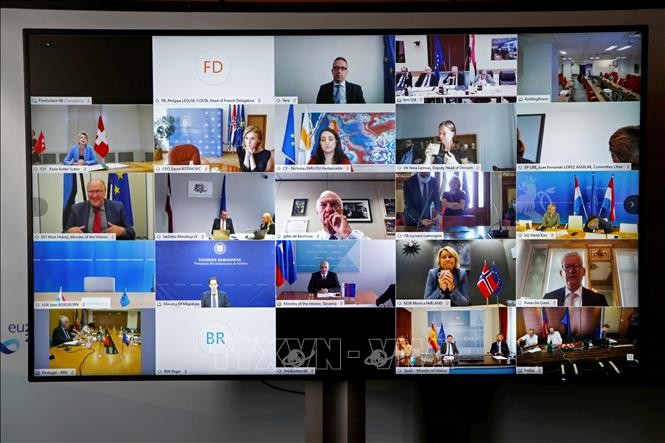(VOVWORLD) - The EU has reactivated talks on the New Pact on Migration and Asylum to reform a migration policy which has previously failed. This is the first time all 27 EU countries have been involved in the discussions. Migration has been one of the thorniest issues in the EU in recent years.
 EU Interior Ministers attend a virtual talks on new EU Pact on Migration and Asylum on October 8, 2020. (photo: AFP/VNA) EU Interior Ministers attend a virtual talks on new EU Pact on Migration and Asylum on October 8, 2020. (photo: AFP/VNA) |
More than 1 million people entered the EU in 2015, causing a political crisis, putting a heavy burden on the security and social welfare of many countries, and provoking right-wing extremism.
Five years later the EU countries are still struggling with the consequences of migration.
New Pact on Migration and Asylum
In late September the European Commission issued a new policy on migration and asylum. The new pact removes the old quotas on asylum seekers. Instead, each year the EC will set quotas for countries based on their economic power, population, and capacity. This clears the problem of quotas that many EU countries have rejected as inflexible and unfair.
The new pact creates an option for countries that don’t want to take more migrants to make a bigger financial contribution, mainly to pay the cost of deporting rejected asylum seekers. The new policy aims to reduce pressure on frontline countries through a compulsory solidarity mechanism. Member countries must balance receiving migrants and supporting countries that do receive them.
Countries that accept migrants will receive 10,000 euros per person and 12,000 euros for each adolescent from the EU's coffers.
Differences remain
The new policy creates a flexible but compulsory contribution system, which allows member countries to host migrants, support states who do host migrants, or help migrants return to their homeland.
The new pact is scheduled to take effect in 2023. Before that it needs approval from all 27 EU members and the European parliament. After the talks on October 8th, Germany’s Interior Minister Horst Seehofer said there are still differences on certain issues, which he did not revealed.
Migration is not just an issue for certain countries, it is a challenge for the bloc. And indications are that consensus for the new pact may not be reached by December as is the wish of Germany, the EU’s current President.